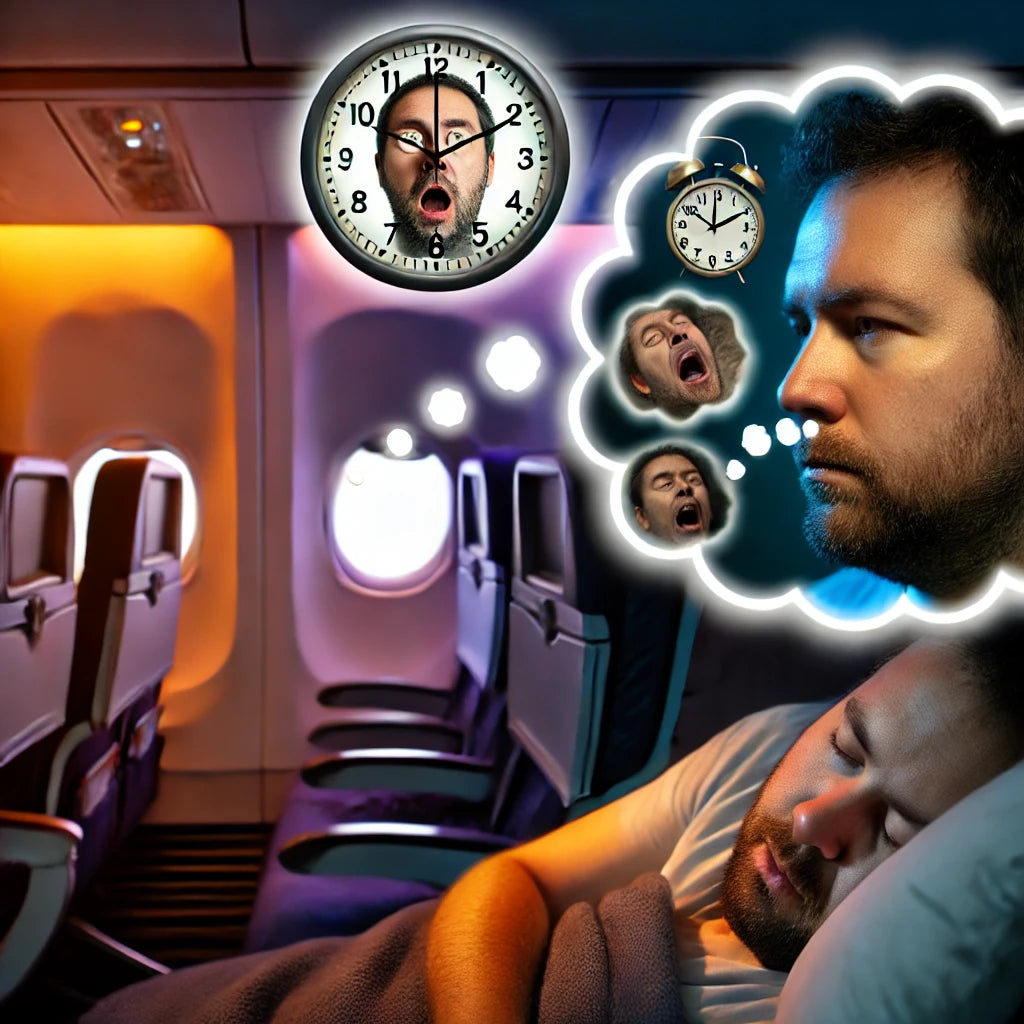Introduction
Traveling is one of life’s great joys, offering the chance to explore new places, meet new people, and experience different cultures. However, the excitement of travel often comes with its challenges, particularly when it involves crossing multiple time zones. One of the most common issues travelers face is jet lag—a temporary sleep disorder that occurs when your body’s internal clock is out of sync with the local time at your destination. While jet lag itself is problematic, it can also exacerbate other sleep-related issues, such as snoring.
In this blog, we will delve deep into the connection between jet lag, snoring, and overall sleep quality. Understanding how these factors are interrelated can help you take steps to mitigate their impact, ensuring that your travel experiences are as enjoyable and restful as possible.
What is Jet Lag?
Jet lag is a physiological condition that results from disruptions to the body’s circadian rhythm, the internal clock that governs your sleep-wake cycle, among other functions. This rhythm is primarily regulated by exposure to natural light and darkness, which signal to your brain when it’s time to be awake and when it’s time to sleep. When you travel across multiple time zones, especially in a short period, your circadian rhythm struggles to adjust to the new time zone, leading to a mismatch between your internal clock and the local time.
The severity of jet lag can vary depending on several factors:
- Number of Time Zones Crossed: The more time zones you cross, the more severe your jet lag is likely to be. Eastward travel (e.g., New York to Paris) generally results in more severe jet lag than westward travel (e.g., New York to Los Angeles) because it requires you to shorten your day, which is harder for the body to adjust to.
- Individual Differences: Some people are more resilient to jet lag than others, possibly due to genetic differences in how their bodies regulate sleep.
- Age: Older adults may experience more pronounced jet lag symptoms than younger individuals.
- Pre-Travel Routine: How well you prepare for your trip can also influence the severity of your jet lag.
The symptoms of jet lag can be wide-ranging, but they typically include:
- Fatigue and Drowsiness: You may feel unusually tired during the day, even after what should have been a full night’s sleep.
- Insomnia: Despite feeling tired, you might have difficulty falling asleep or staying asleep at night.
- Mood Disturbances: Jet lag can lead to irritability, mood swings, and even symptoms of depression.
- Cognitive Impairment: You may find it harder to concentrate, remember things, or make decisions.
- Digestive Issues: Jet lag can also affect your digestive system, leading to symptoms like bloating, constipation, or diarrhea.
Given that sleep is crucial for overall health and well-being, it’s no surprise that jet lag can have a profound impact on your sleep quality. But how does this tie into snoring?
How Jet Lag Can Worsen Snoring

Snoring occurs when the flow of air through the mouth and nose is partially obstructed during sleep, causing the tissues in the throat to vibrate and produce sound. Several factors can contribute to snoring, including the anatomy of your mouth and sinuses, alcohol consumption, allergies, colds, and your sleeping position. However, one of the less commonly discussed triggers of snoring is poor sleep quality—an issue that is closely tied to jet lag.
Here’s how jet lag can make snoring worse:
- Disrupted Sleep Patterns: Jet lag often results in fragmented sleep, where you wake up frequently during the night. This disrupted sleep can increase the likelihood of snoring. When you’re sleep-deprived, your muscles, including those in your throat, can become overly relaxed during sleep, leading to partial airway obstruction and snoring. Additionally, spending more time in lighter stages of sleep (as often happens with jet lag) can make you more prone to snoring, as deep sleep is when the body is least likely to snore.
- Dehydration: Long flights, especially those in pressurized cabins, can lead to dehydration. When you’re dehydrated, the tissues in your throat and nasal passages can become dry and irritated, increasing the likelihood of snoring. Dehydration also thickens the mucus in your airways, which can further contribute to obstruction and snoring.
- Air Quality and Dry Air: The air in airplane cabins is typically very dry, with humidity levels often below 20% (compared to 30-50% in most indoor environments). This dry air can dry out the mucous membranes in your nose and throat, making snoring more likely. The use of air conditioning in hotel rooms can have a similar effect, exacerbating snoring after you’ve landed.
- Alcohol and Sleep Aids: Many travelers turn to alcohol or over-the-counter sleep aids to help them fall asleep on planes or adjust to a new time zone. However, both alcohol and many sleep aids can relax the muscles in your throat, increasing the likelihood of snoring. Alcohol, in particular, can worsen snoring by relaxing the muscles in the upper airway and by causing inflammation in the throat and nasal passages.
- Sleep Position: Jet lag can lead to restless sleep, where you change positions frequently during the night. Sleeping on your back is known to increase the likelihood of snoring because gravity causes the tongue and soft tissues in the throat to collapse backward, partially obstructing the airway. When you’re jet-lagged and tossing and turning, you’re more likely to end up in a position that promotes snoring.
- Overeating Before Sleep: Jet lag can throw off your eating schedule, leading you to eat large meals at times when you wouldn’t normally eat. Eating a heavy meal close to bedtime can increase the likelihood of snoring by putting pressure on the diaphragm and relaxing the throat muscles.
The Role of Sleep Quality in Managing Jet Lag and Snoring

Sleep quality is a critical factor in managing both jet lag and snoring. Good sleep quality means not only getting enough hours of sleep but also spending sufficient time in the deeper stages of sleep, where your body can fully rest and recover. Unfortunately, jet lag often disrupts both the quantity and quality of sleep, creating a vicious cycle where poor sleep leads to snoring, and snoring further disrupts sleep.
When your sleep is of poor quality, your body is unable to fully recover from the stresses of travel. This can lead to prolonged jet lag symptoms, making it harder for you to adjust to the new time zone. Moreover, the fatigue and irritability that come with poor sleep can further strain your ability to enjoy your travels and participate in activities.
On the other hand, high-quality sleep can help mitigate the effects of jet lag and reduce the likelihood of snoring. When you sleep well, your body is better able to regulate its circadian rhythm, making it easier to adjust to new time zones. Additionally, deep sleep promotes muscle relaxation and reduces the likelihood of airway obstruction, which can help minimize snoring.
Is Your Snoirng Keeping Your Travel Companion Awake?

Traveling with a snorer can turn a peaceful night into a restless ordeal, but SoundOff Noise Masking earbuds are here to save the day. These innovative earbuds use advanced noise masking technology using a Proprietary Pink Noise to create a soothing sound environment that effectively drowns out the disruptive noise of snoring. By producing a gentle, consistent Pink Noise, SoundOff earbuds not only mask the unwanted noise but also will help your travel companion drift off into a deep, uninterrupted sleep. Whether on a plane, in a hotel, or staying with friends, these earbuds ensure that snoring won’t sabotage your travel companions rest or sleep, so they can wake up refreshed and ready for whatever the day has in store.
Conclusion
Understanding the connection between jet lag, snoring, and sleep quality is essential for anyone who travels frequently or across multiple time zones. Jet lag can exacerbate snoring by disrupting sleep patterns, leading to dehydration, and promoting behaviors (such as alcohol consumption) that increase the likelihood of snoring. However, by recognizing these connections, you can take proactive steps to minimize their impact.

































